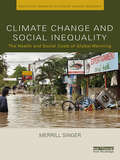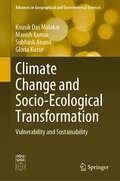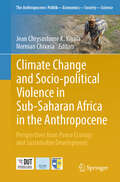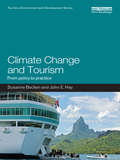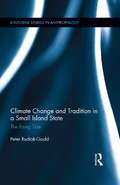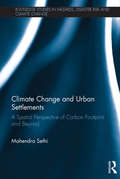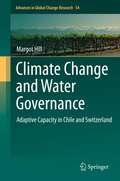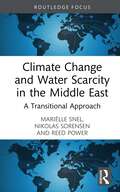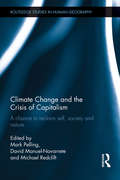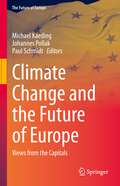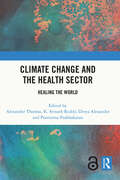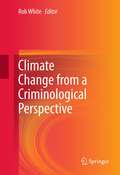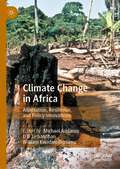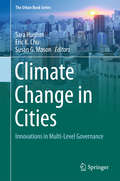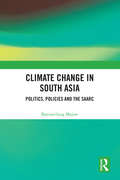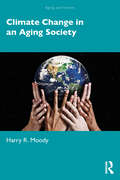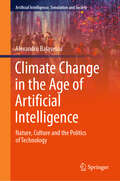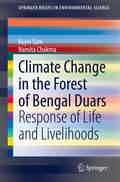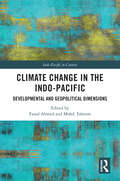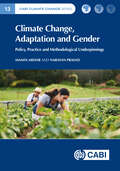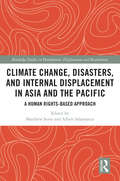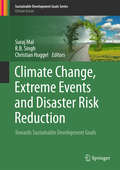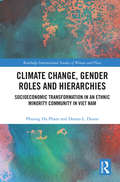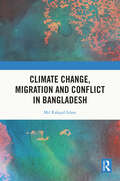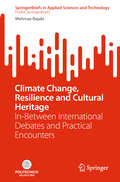- Table View
- List View
Climate Change and Social Inequality: The Health and Social Costs of Global Warming (Routledge Advances in Climate Change Research)
by Merrill SingerThe year 2016 was the hottest year on record and the third consecutive record-breaking year in planet temperatures. The following year was the hottest in a non-El Nino year. Of the seventeen hottest years ever recorded, sixteen have occurred since 2000, indicating the trend in climate change is toward an ever warmer Earth. However, climate change does not occur in a social vacuum; it reflects relations between social groups and forces us to contemplate the ways in which we think about and engage with the environment and each other. Employing the experience-near anthropological lens to consider human social life in an environmental context, this book examines the fateful global intersection of ongoing climate change and widening social inequality. Over the course of the volume, Singer argues that the social and economic precarity of poorer populations and communities—from villagers to the urban disadvantaged in both the global North and global South—is exacerbated by climate change, putting some people at considerably enhanced risk compared to their wealthier counterparts. Moreover, the book adopts and supports the argument that the key driver of global climatic and environmental change is the global economy controlled primarily by the world’s upper class, which profits from a ceaseless engine of increased production for national middle classes who have been converted into constant consumers. Drawing on case studies from Alaska, Ecuador, Bangladesh, Haiti and Mali, Climate Change and Social Inequality will be of great interest to students and scholars of climate change and climate science, environmental anthropology, medical ecology and the anthropology of global health.
Climate Change and Socio-Ecological Transformation: Vulnerability and Sustainability (Advances in Geographical and Environmental Sciences)
by Manish Kumar Subhash Anand Kousik Das Malakar Gloria KuzurThis book focuses on various psycho-social and socio-physical aspects of climate change and includes a wide range of case studies. Included topics are notable climate-related social thinking; climate vulnerability; transformation in socio-ecological subsystems; bioclimatological, urban bioclimatological and socio-bioclimatic ideas; disasters; policy instruments; climate justice; human rights; and sustainability. The book distinguishes itself from similar works by including a wide variety of topics and assists policy management in the current and upcoming climate crisis era. This book also addresses the Sustainable Development Goals 13 (Take Urgent Action to Combat Climate Change and Its Impacts), highlighting resilience, recovery potential and adaptive capacity, climate change measures integrated into policies and planning, and knowledge and capacity to mitigate climate change. The ideas covered in this book evolved in response to the current climate crisis, ideas that the authors believe will aid in societal management and development in the present and future. The book is a useful source for planners, geographers, professionals, academics, government officials, laypeople, and others interested in climate change.
Climate Change and Socio-political Violence in Sub-Saharan Africa in the Anthropocene: Perspectives from Peace Ecology and Sustainable Development (The Anthropocene: Politik—Economics—Society—Science #37)
by Jean Chrysostome K. Kiyala Norman ChivasaThis book explores the theoretical contribution of peace ecology to the understanding and practice of environmental and conventional peacebuilding. It integrates environmental questions and factors that drive socio-political violence and climate change-induced violence in Sub-Saharan Africa in the Anthropocene.· It demonstrates how international peace and global security are no longer solely grounded in conventional peacebuilding that has evolved from liberal to democratic peace theories, but rather in the complex, critical and synergic relations between peace studies and environmental studies.· It provides a pluridisciplinary body of knowledge that emphasises the need for food security, social climate, social good, social capital and sustainable development at the age of climate change and climate wars.· It underscores the potential of peace ecology to reduce the Earth systems' vulnerability, to mitigate anthropogenic global warming's consequences on humanity, the ecosystem and biodiversity.· It yields various models of peacebuilding, conflict-sensitive and climate-sensitive adaptation strategies to enhance the African Region’s security and stability.Finally, this volume argues that planetary boundaries framework remains the safer space within which human and sustainable development can be pursued and attained, and future generations to thrive. A comprehensive and international response to socio-political violence and climate-change induced violence should take into account the vulnerability of individual countries, regions and the global world in order to achieve the dreams of a better future; that makes this book a cutting-edge scholarly work.
Climate Change and Tourism: From Policy to Practice (Tourism, Environment and Development Series)
by Susanne Becken John HayThe contribution of tourism to climate change, and the likely consequences of climate change for key tourist destinations, has been well reported and discussed. Yet, there is a lack of evidence-based systematic practical advice as to how the tourism industry should respond to the challenge of climate change. Building on a sound conceptual understanding of the links between climate change and tourism, this book shows how the tourism sector might best respond. It not only focuses on the roles of supportive policies and institutions in ensuring a strong "enabling environment" for practical responses, but also on the practical responses themselves. This practical approach is presented through a large number of case studies and examples which illustrate how policy and industry initiatives have been implemented in tourism, and if or why they were successful. The majority of examples come from places such as the Caribbean, Spain, the Maldives, Nepal, and the UK, as well as Australia, New Zealand and other parts of the Pacific. The examples are presented within an overall framework that facilitates the translation of adaptation and mitigation policies into practice. This book offers the tourism industry, students and academics the opportunity to advance from the earlier, more conceptual texts on tourism and climate change by taking a much more practical approach. Its global coverage, through the use of international case studies, fosters a cross-fertilisation of ideas and initiatives. This text provides a detailed analysis of best practices in the face of climate change, across countries and geographically diverse tourist destinations and operations.
Climate Change and Tradition in a Small Island State: The Rising Tide (Routledge Studies in Anthropology #13)
by Peter Rudiak-GouldThe citizens of the Marshall Islands have been told that climate change will doom their country, and they have seen confirmatory omens in the land, air, and sea. This book investigates how grassroots Marshallese society has interpreted and responded to this threat as intimated by local observation, science communication, and Biblical exegesis. With grounds to dismiss or ignore the threat, Marshall Islanders have instead embraced it; with reasons to forswear guilt and responsibility, they have instead adopted in-group blame; and having been instructed that resettlement is necessary, they have vowed instead to retain the homeland. These dominant local responses can be understood as arising from a pre-existing, vigorous constellation of Marshallese ideas termed "modernity the trickster": a historically inspired narrative of self-inflicted cultural decline and seduction by Euro-American modernity. This study illuminates islander agency at the intersection of the local and the global, and suggests a theory of risk perception based on ideological commitment to narratives of historical progress and decline.
Climate Change and Urban Settlements: A Spatial Perspective of Carbon Footprint and Beyond (Routledge Studies in Hazards, Disaster Risk and Climate Change)
by Mahendra SethiClimate change and urbanization are two of the greatest challenges facing humanity in the 21st century, and their effects are converging in dangerous ways. Cities contribute significantly to global warming, and as the world further takes a rural-urban population tilt, the next few decades pose a great challenge in addressing global disparities in the access and allocation of carbon. This book explores the ways in which cities, through their spatial development, contribute to greenhouse gas (GHG) emissions and looks at the ways in which rapidly urbanizing cities in low- and middle-income countries can be planned to reduce overall GHG emissions. The book considers key questions such a: What should be the appropriate economies of scale for cities in a country? What is the most favourable rate of urbanization? What should be the most suitable spatial pattern for a city? And what are appropriate regulatory, economic or governance mechanisms to achieve a low-carbon society? These issues are explored through data analysis of over 156 developing countries and through a specific case study of India. India acts as an interesting example of how societies undergoing rural-to-urban transformations could become green within the planetary boundaries while systematically addressing national and local urban governance. The research concludes with a future pathway that is committed to low-carbon and high-equity spatial development, and will find pertinence to researchers and practitioners alike. This book provides a new tool for policymakers, planners and scholars to rationally and equitably account for global carbon space, prioritize low-carbon strategies for national urbanization and planning individual cities, in addition to recommending an urban governance framework inclusive of green agenda.
Climate Change and Water Governance: Adaptive Capacity in Chile and Switzerland (Advances in Global Change Research #54)
by Margot HillThe book presents detailed case studies examining the Rhône Basin in the Canton Valais, Switzerland and the Aconcagua Basin in Valparaiso, Chile. In order to understand and assess the interplay of complex and interlinked environmental and socio-economic issues, the author looks beyond the technology, modelling, engineering and infrastructure associated with water resources management and climate change adaptation, to assess the decision-making environment within which water and adaptation policy and practices are devised and executed.
Climate Change and Water Scarcity in the Middle East: A Transitional Approach (Earthscan Studies in Water Resource Management)
by Mariëlle Snel Nikolas Sorensen Reed PowerAs water's significance as a geopolitical resource is poised to surpass that of oil, this book explores the adaptation of Water, Sanitation, and Hygiene (WASH) services in the Middle East to climate change challenges, leveraging the Humanitarian-Development-Peace nexus for a sustainable transition and resilient solutions. Delving into the humanitarian and development sectors across the region, the authors advocate for a transformative approach towards more innovative, integrated, and localized programming. It draws a parallel between the increasing global shift in humanitarian needs, as starkly revealed by the COVID-19 pandemic, and the ongoing devastation wrought by climate change, particularly through water-related crises such as flooding, drought, famine, and conflict. The authors stress the urgent need for adaptive and sustainable strategies that can swiftly respond to evolving climate challenges. This book argues that there is currently a window of opportunity for WASH practitioners to develop broader, multi-sectoral experiences to meet these challenges. Drawing on discussions with humanitarian and development practitioners and new contemporary case studies, this book analyzes the financial, institutional, environmental, technical, and socio-cultural considerations for creating sustainable WASH services in transition. The narrative emphasizes the urgent need for a Humanitarian-Development-Peace nexus approach, advocating for multisectoral collaboration and localization as vital to addressing protracted crises and climate change's escalating threats. It calls for a strategic shift towards organizations that merge immediate humanitarian aid with sustainable development, enhancing local capacities for effective, enduring solutions. The authors conclude by outlining practical actions for humanitarian and development organizations at the local, national, regional, and global levels to support effective integrated and transitional WASH programming in the future.
Climate Change and the Crisis of Capitalism: A Chance to Reclaim, Self, Society and Nature (Routledge Studies in Human Geography)
by Mark Pelling Michael Redclift David Manuel-NavarreteAre established economic, social and political practices capable of dealing with the combined crises of climate change and the global economic system? Will falling back on the wisdoms that contributed to the crisis help us to find ways forward or simply reconfigure risk in another guise? This volume argues that the combination of global environmental change and global economic restructuring require a re-thinking of the priorities, processes and underlying values that shape contemporary development aspirations and policy. This volume brings together leading scholars to address these questions from several disciplinary perspectives: environmental sociology, human geography, international development, systems thinking, political sciences, philosophy, economics and policy/management science. The book is divided into four sections that examine contemporary development discourses and practices. It bridges geographical and disciplinary divides and includes chapters on innovative governance that confront unsustainable economic and environmental relations in both developing and developed contexts. It emphasises the ways in which dominant development paths have necessarily forced a separation of individuals from nature, but also from society and even from ‘self’. These three levels of alienation each form a thread that runs through the book. There are different levels and opportunities for a transition towards resilience, raising questions surrounding identity, governance and ecological management. This places resilience at the heart of the contemporary crisis of capitalism, and speaks to the relationship between the increasingly global forms of economic development and the difficulties in framing solutions to the environmental problems that carbon-based development brings in its wake.. Existing social science can help in not only identifying the challenges but also potential pathways for making change locally and in wider political, economic and cultural systems, but it must do so by identifying transitions out of carbon dependency and the kind of political challenges they imply for reflexive individuals and alternative community approaches to human security and wellbeing. Climate Change and the Crisis of Capitalism contains contributions from leading scholars to produce a rich and cohesive set of arguments, from a range of theoretical and empirical viewpoints. It analyses the problem of resilience under existing circumstances, but also goes beyond this to seek ways in which resilience can provide a better pathway and template for a more sustainable future. This volume will be of interest to both undergraduate and postgraduate students studying Human Geography, Environmental Policy, and Politics.
Climate Change and the Future of Europe: Views from the Capitals (The Future of Europe)
by Michael Kaeding Paul Schmidt Johannes PollakWhile the ambitious objectives outlined in the EU’s Green Deal aim at making Europe the first climate-neutral continent by 2050, national implementation greatly varies depending on local geographies, history, culture, economics, and politics. This book analyses Member States’ and EU neighbours’ national efforts to combat climate change. It subsequently draws on these factors to highlight local challenges, tensions, and opportunities on the road towards climate neutrality. In the context of inter-country dependencies following Russia’s war against Ukraine, it addresses strategic questions regarding EU integration, the transformation of our economies, the reduction of energy dependencies, and public perception of the above. The book also makes concrete recommendations, in various policy areas, on how individual countries and the EU as a whole should deal with the climate crisis.
Climate Change and the Health Sector: Healing the World
by Alexander Thomas K. Srinath Reddy Divya Alexander Poornima PrabhakaranThe health sector is known to be one of the major contributors towards the greenhouse gas emissions causing the climate crisis, the greatest health threat of the 21st century. This volume positions the health sector as a leader in the fight against climate change and explores the role of the health system in climate policy action. It delivers an overview of the linkages between climate change and the health sector, with chapters on the impact of climate change on health, its connection to pandemics, and its effects on food, nutrition and air quality, while examining gendered and other vulnerabilities. It delves into the different operational aspects of the health sector in India and details how each one can become climate-smart to reduce the health sector’s overall carbon footprint, by looking at sustainable procurement, green and resilient healthcare infrastructure, and the management of transportation, energy, water, waste, chemicals, pharmaceuticals and plastics in healthcare. Well supplemented with rigorous case studies, the book will be indispensable for students, teachers, and researchers of environmental studies, health sciences, and climate change. It will be useful for healthcare workers, public health officials, healthcare leaders, policy planners, and those interested in climate resilience and preparedness in the healthcare sector.
Climate Change from a Criminological Perspective
by Rob WhiteFew would dispute the power of climate change to lead to profoundly destructive weather events. At the same time, the possibility of climate change as a consequence--or even a cause--of criminal events is far less recognized. As the earth grows warmer, issues regarding land use, water rights, bio-security, and food production and distribution will continue to have far-reaching impact, and produce more opportunity for offenses by individuals and groups as well as political and corporate entities. In Climate Change from a Criminological Perspective, a panel of pioneering green criminologists investigates an increasingly complex chain of ecological causes and effects. Illegal acts are analyzed as they contribute to environmental decline (e.g., wildlife poaching) or result from ecological distress (e.g., survival-related theft). Regulatory and other interventions are critiqued, concepts of environmental harm refined, and new research methodologies called for. And while individual events described are mainly local, the contributors keep the global picture, and substantial questions about human rights and social relationships, firmly in mind. Topics featured include: Global warming as corporate crime. Climate change and the courts: U.S. and global views. Climate change, natural disasters, and gender inequality. The roles and responsibilities of environmental enforcement networks. A sociocultural perspective on climate change denial. PLUS: instructive in-depth chapters on criminological aspects of Hurricane Katrina and the Japanese nuclear disaster. A volume of considerable timeliness and vision, Climate Change from a Criminological Perspective will be read and discussed, and will inspire action, by researchers in criminology, criminal justice, environmental studies, and related disciplines, as well as policymakers.
Climate Change in Africa: Adaptation, Resilience, and Policy Innovations
by Michael Addaney D B Jarbandhan William Kwadwo DumenuThis edited collection chronicles the public policy responses to climate change and current and potential impacts that will affect critical and priority sectors within and across African countries now and in the coming decades. Contributions cover governance and policy responses to climate change, emphasizing continental governance and policy responses, national governance and policy responses (what selected countries in Africa are doing), and local or community policy and programmatic responses (what some selected major African communities are doing). Each chapter adopts multi-disciplinary and transdisciplinary approaches, combining insights from social and policy sciences, emphasizing existing gaps, particularly in the area of decision-making, governance and local climate action. The book offers both theoretical and practical contributions, with the aim of advancing academic discourse and thinking, policymaking and implementation of climate interventions in Africa.
Climate Change in Cities: Innovations in Multi-Level Governance (The Urban Book Series)
by Sara Hughes Eric K. Chu Susan G. MasonThis book presents pioneering work on a range of innovative practices, experiments, and ideas that are becoming an integral part of urban climate change governance in the 21st century. Theoretically, the book builds on nearly two decades of scholarships identifying the emergence of new urban actors, spaces and political dynamics in response to climate change priorities. However, it further articulates and applies the concepts associated with urban climate change governance by bridging formerly disparate disciplines and approaches. Empirically, the chapters investigate new multi-level urban governance arrangements from around the world, and leverage the insights they provide for both theory and practice. Cities - both as political and material entities - are increasingly playing a critical role in shaping the trajectory and impacts of climate change action. However, their policy, planning, and governance responses to climate change are fraught with tension a nd contradictions. While on one hand local actors play a central role in designing institutions, infrastructures, and behaviors that drive decarbonization and adaptation to changing climatic conditions, their options and incentives are inextricably enmeshed within broader political and economic processes. Resolving these tensions and contradictions is likely to require innovative and multi-level approaches to governing climate change in the city: new interactions, new political actors, new ways of coordinating and mobilizing resources, and new frameworks and technical capacities for decision making. We focus explicitly on those innovations that produce new relationships between levels of government, between government and citizens, and among governments, the private sector, and transnational and civil society actors. A more comprehensive understanding is needed of the innovative approaches being used to navigate the complex networks and relationships that constitute contemporary multi-level urban climate change governance. Debra Roberts, Co-Chair, Working Group II, IPCC 6th Assessment Report (AR6) and Acting Head, Sustainable and Resilient City Initiatives, Durban, South Africa "Climate Change in Cities offers a refreshingly frank view of how complex cities and city processes really are. " Christopher Gore, Associate Professor and Chair, Department of Politics and Public Administration, Ryerson University, Canada "This book is a rare and welcome contribution engaging critically with questions about cities as central actors in multilevel climate governance but it does so recognizing that there are lessons from cities in both the Global North and South. " Harriet Bulkeley, Professor of Geography, Durham University, United Kingdom "This timely collection provides new insights into how cities can put their rhetoric into action on the ground and explores just how this promise can be realised in cities across the world - from California to Canada, India to Indonesia. "
Climate Change in South Asia: Politics, Policies and the SAARC
by Baniateilang MajawThis volume studies the challenges of climate change in South Asia and examines the role of the South Asian Association for Regional Cooperation (SAARC) in addressing them. It highlights the dangers posed by climate change in South Asia and underlines the need to strengthen and intensify regional cooperation to preserve, protect and manage the diverse and fragile eco-systems of the region. The book examines policies and initiatives of the SAARC in tackling these issues and also analyzes their implementation by member countries. Comprehensive and topical, this volume will be useful for scholars and researchers of South Asian Studies, environmental studies, climate change studies, public policy and governance, development studies, international relations, regional cooperation, and political studies. It will also be of importance to policymakers and NGOs working in this field.
Climate Change in an Aging Society (Aging and Society)
by Harry R. MoodyClimate Change in an Aging Society is the first book fully devoted to the impact of climate change on those who are old today—and those who will be old in decades to come. In doing so, Moody focuses on issues of critical importance: aging in place; health and age in a warming world; responsibility for the climate crisis; options for climate-conscious consumers; planning for investment for a green retirement; and opportunities for political action.The number of Americans aged over 65 is projected to rise from 17% to 21%. By 2060 nearly one in four Americans will be 65 or older. By 2050, however, average temperatures in the USA could rise by as much as 3°C, and extreme weather events are likely to become more frequent and severe. Despite these alarming projections and the likelihood that climate change will cause serious health issues among the elderly, little attention has been devoted to the impact of climate change on this demographic. Employing a life-course perspective and a cross-generational approach, Moody assesses the impact of climate change on those who are old today and those who will be old in years to come. Challenging both climate complacency and climate defeatism, the book adopts as its clarion call, HERE NOW YOU HOPE.Written in an engaging personal style with highlighting case studies of influential "eco-elders," this urgent book will be of great interest to students and scholars with interests in climate change, gerontology, and environmental and social policy.
Climate Change in the Age of Artificial Intelligence: Nature, Culture and the Politics of Technology (Artificial Intelligence, Simulation and Society)
by Alexandru BalasescuThis book invites the reader to follow seemingly unrelated paths towards the same goal: making sense of what it means to be human in a world that casually blends discourses on nature, technology, and biology with ideas of progress, optimization and their capitalization at the centre. The author critically analyses current thinking which often looks at technological solutions to the challenges posed by climate change, and where artificial intelligence is instrumental in fulfilling the promise of ecological capitalism. He instead advocates that we take a closer look at the politics of optimization within and outside managerial perspectives, which could reveal that one of the main sources of our repeated failures related to governance and climate change lies not intrinsically in the qualities of the tools we use, but in the underlying assumptions with which we design, and in the scope of their use. Therefore, the book looks at possible solutions for humanity that may lie between the rock of technology and the hard place of nature. That is, it asks for a revision in our implicit assumptions for building our tools; critiques the thinking about our relationships with them; and re-assesses their use. Richly documented, imaginatively argued, and captivatingly written, this book explores unexpected entanglements of nature, culture, and technology that emerge in A.I.&’s unruly and unforeseen trajectories. - George Paul Meiu, Professor of Anthropology, University of Basel Balasescu develops wide-ranging thick-descriptions that provocatively draw together lotus flowers and data banks, snakes and algorithms to delve into how bodies, cultures and power are invisibly ensconced in every aspect of the digital realm. - Susan Ossman, Distinguished Professor of Anthropology, University of California Riverside This important work traces the evolution and development of the paradigms that made artificial intelligence possible and perhaps even inevitable. - Guy Nasmyth,<spa
Climate Change in the Forest of Bengal Duars: Response of Life and Livelihoods (SpringerBriefs in Environmental Science)
by Koyel Sam Namita ChakmaThis book focuses on more than 100 years of climatic oscillation in Bengal Duars, a unique foothill landscape of the Eastern Himalaya, to discuss the dynamics of life and livelihoods of forest dependent communities towards climate change related impacts. The authors describe the struggles the people of this region face, including climate vulnerability, displacement, migration, and human-animal conflict, and provides a unique and comprehensive analysis of the interconnection between perceptions and responses of forest villagers for survival and adaptation to climate change. The book presents advanced quantitative methods and field-based studies applied in the region to help researchers and policy makers comprehend and measure potential and actual adaptation attitudes of the villagers, while also understanding the present challenges, risk patterns, and potential impacts climate change has on the natural environment and community life. The book will additionally be of interest to students and researchers in geography, forestry, ecology and environmental science.
Climate Change in the Indo-Pacific: Developmental and Geopolitical Dimensions (Indo-Pacific in Context)
by Faisal Ahmed and Mohd. FaheemThis book explores multifarious policy dimensions relevant to climate change and its associated vulnerabilities in the Indo-Pacific region.The essays in the volume focus on:• Climate resilience in terms of policy implementation at the local, national, and regional levels in Asia-Pacific;• Understanding climate change through the lens of non-traditional security;• Assesses geo-economic and geopolitical impacts and adaptation strategies;• Examines issues of climate refugees and migration.The volume will be of great interest to scholars and researchers of politics, public policy, environment and sustainability studies, climate action and Indo-Pacific studies.
Climate Change, Adaptation and Gender: Policy, Practice and Methodological Underpinnings (CABI Climate Change Series #17)
by Dr Mamta Mehar Professor Narayan PrasadThis book offers a wide, in-depth study of the gender-climate change-agriculture nexus. The crux of understanding these connections comprises gender equality and tools to measure gender discrimination, the evolution of the concept of gender inclusiveness and its concerns; and the need to address the same by formulating gender-inclusive policymaking. Despite the fact that more than 50 years have elapsed since gender concerns were included in explorations of this nexus, there is still ambiguity around the foundations, connections, and approaches for planning gender-inclusive climate policies. This book aims to clear that ambiguity by: · Being the first to explore exclusively this issue in detail. · Revealing how and why consideration of gender is so important for understanding how climate change impacts rural communities and agricultural systems globally. · Exploring every dimension of climate change (including belief systems and perceptions, knowledge, experience, coping strategies, adaptation, and mitigation strategies) and linking it to gender. It includes new theoretical and methodological approaches that go far beyond the household as the unit of analysis (using various approaches, including intersectional analysis). The book not only throws light on major themes of research, but also covers different methodologies ranging from review methods to mathematical models, conceptual frameworks and empirical analysis. It will be of wide interest to students, scholars, and researchers in gender studies, agriculture, climate change and rural development research, and also to practitioners, extension workers, and planners designing new climate-resilient practices.
Climate Change, Disasters, and Internal Displacement in Asia and the Pacific: A Human Rights-Based Approach (Routledge Studies in Development, Displacement and Resettlement)
by MatthewAlbert Scott SalamancaThis book examines how states in eight countries across Asia and the Pacific address internal displacement in the context of disasters and climate change. The Asia and the Pacific region accounts for the majority of global disaster-related displacement, but the experience of the millions of individuals displaced differs according to gender, age, ethnicity, (dis)ability, caste, and so forth and is dependent on the legal, administrative, social, and economic structures and processes in place to support them. This book adopts a human rights-based approach, investigating the role of law and policy in preventing displacement, protecting people who are displaced, and engendering durable solutions across cases drawn from Thailand, Cambodia, Indonesia, the Philippines, Nepal, Bangladesh, Vanuatu, and the Solomon Islands. The specific cases in the book also reflect critically on the term ‘displacement’ and the wider normative framework within which this phenomenon is conceptualised and addressed. The book will be of interest to students, researchers, and practitioners working at the intersection of human rights, human mobility, development, disaster risk reduction and management, and climate change adaptation.
Climate Change, Extreme Events and Disaster Risk Reduction: Towards Sustainable Development Goals (Sustainable Development Goals Series)
by Christian Huggel R. B. Singh Suraj MalThis book discusses the science, causes, impacts and risk reduction strategies for climate change and disasters. It focuses on the use of traditional knowledge, new innovation and education to build a culture of safety and resilience at all levels in order to promote sustainable development goals in general and disaster risk reduction in particular. The global climate has changed substantially over the last century. There is strong evidence of global climate change in the form of increase in air and sea surface temperature, recession of glaciers, changes and shifting of climate regimes, increasing number of extreme events and sea levels changes. The increasing frequency of climate change induced disasters in particular is posing a threat to resilience, lives and livelihoods at global, regional and local levels. Major ecosystems of the world have experienced several climate induced disaster events in recent past. This book provides new insights into the occ urrence and impacts of climatic extremes and strategies for disaster risk reduction. It includes studies on rainfall and temperature trends, floods and drought disasters, weather and climatic related disasters in mountains, changes in plant activities, risk assessment and responses in different ecosystems of the world. The book is particularly useful for environmental and disaster managers, researchers and graduate students, as well as policy makers.
Climate Change, Gender Roles and Hierarchies: Socioeconomic Transformation in an Ethnic Minority Community in Viet Nam (Routledge International Studies of Women and Place)
by Phuong Ha Pham Donna L. DoaneThis book examines changing gender roles, relations and hierarchies in an ethnic minority community in Central Viet Nam. After decades of war, the community continued its self-sufficient way of life in this remote forested mountainous region, but in recent years has been forced to respond to severe climate threats combined with sudden and destabilizing socioeconomic and regulatory change. Through the use of both qualitative (interview-based) and quantitative research methods, the book offers insights into the complex interactions between climate, regulatory and socioeconomic changes – including, paradoxically, the emergence of significant problems for both the community and the environment in the wake of policies designed to protect the natural environment. Facing greatly increased food and livelihood insecurity, the women and men of the community were pushed into the mainstream market economy without being fully prepared to participate in an economy that is still very new to them. These sudden transitions caused major shifts in gender roles and hierarchies, opening up new possibilities for women to increase their social status in a highly patriarchal context, but also at a cost for both women and men as women’s burdens increased and men’s traditional roles and livelihoods were lost. The book examines recent trends, including unanticipated changes and new possible policy-related approaches, and draws international comparisons with other ethnic minority, indigenous and remote communities facing similar complex forces of change. This book will be of interest to scholars and postgraduate students of climate change, gender, environment, and public policy and development studies.
Climate Change, Migration and Conflict in Bangladesh
by Md Rafiqul IslamThis book explores the relationship between climate-change-induced migration and conflict in Bangladesh – one of the most ecologically fragile countries in the world. It explores why people migrate from their original place of land; and how the migration of people with a different background to an ethnically distinctive region due to environmental changes can become a source of conflict and violence between the host peoples and migrants. The volume focuses on Chittagong Hill Tracts (CHT) which has experienced long-standing ethno-political conflict due to migration caused by floods, cyclone, sea-level rise and disasters. It traces the history of the ethnic conflict in the region and presents key findings from the field, as well as the dynamics of everyday politics in the region. This volume also highlights how internally climate-displaced people generate violence and civil strife in the major urban cities through their settlements in slums. The volume will be of great interest to scholars and researchers of environmental studies, human geography, migration and diaspora studies, public policy, social anthropology and South Asian studies.
Climate Change, Resilience and Cultural Heritage: In-Between International Debates and Practical Encounters (SpringerBriefs in Applied Sciences and Technology)
by Mehrnaz RajabiThis book showcases the cross-disciplinary and “systemic” relationships among climate change, resilience, and cultural heritage. It critically reviews the contemporary international documents and scholarly debates of the climate science, disaster risk management, and heritage fields and reveals that, within the comprehensive point of view, the potential and advances in one field could be instrumentalized in other fields. Moreover, it provides tailor-made considerations and practical recommendatory encounters toward resilient cultural heritage in facing climate change as a “disaster risk driver”. Lastly, the book highlights the significance of the cultural dimension of climate change as well as the global landscape of systemic risk while redefining a new comprehensive and holistic definition of resilience for the heritage field.
